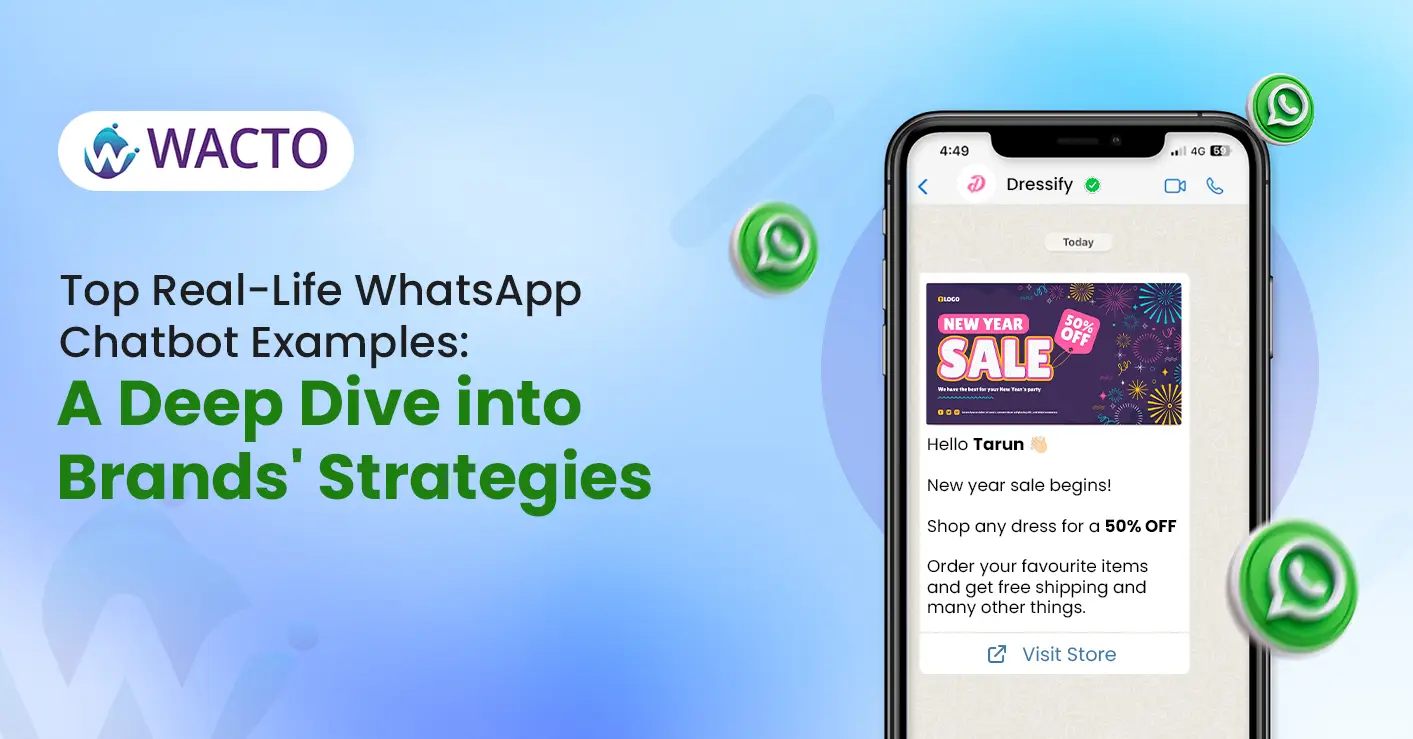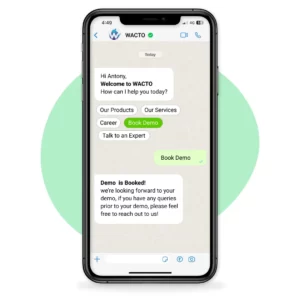
In an era where instant communication is key, businesses are increasingly turning to WhatsApp chatbots to streamline their operations and enhance customer engagement. But what exactly are WhatsApp chatbots, and how are they transforming business strategies? In this deep dive, we’ll explore real-life examples of successful WhatsApp chatbot implementations and the strategies that make them effective.
What are WhatsApp Chatbots?
WhatsApp chatbots are automated messaging software integrated with the WhatsApp platform, designed to interact with users through chat. They leverage artificial intelligence (AI) and natural language processing (NLP) to understand and respond to user queries in a human-like manner. These chatbots can handle a variety of tasks, from customer service and sales to appointment scheduling and order tracking.
WhatsApp Chatbot Benefits
The benefits of implementing WhatsApp chatbots for businesses are numerous:
- 24/7 Availability: Chatbots provide round-the-clock support, ensuring customer queries are addressed at any time.
- Cost Efficiency: Automating responses reduces the need for a large customer service team, cutting operational costs.
- Scalability: Chatbots can handle multiple interactions simultaneously, making them ideal for businesses of all sizes.
- Enhanced Customer Experience: Quick, accurate responses improve customer satisfaction and engagement.
- Data Collection: Chatbots can gather valuable customer data, helping businesses tailor their offerings and strategies.
Now, let’s look at some top real-life WhatsApp chatbot examples and the strategies that have driven their success.
1. KLM Royal Dutch Airlines
Strategy: Enhancing Customer Support and Engagement
KLM Royal Dutch Airlines uses a WhatsApp chatbot to provide customers with essential travel information and support. Passengers can receive booking confirmations, check-in notifications, boarding passes, and flight status updates directly through WhatsApp.
Benefits:
Improved Communication: The chatbot ensures passengers receive timely updates, reducing anxiety and enhancing the travel experience.
Personalized Service: By integrating with KLM’s booking system, the chatbot provides personalized responses based on the passenger’s flight details.
Key Takeaway:
By leveraging WhatsApp chatbots for real-time communication, KLM enhances customer satisfaction and streamlines its operations, providing a seamless travel experience.
2. HDFC Bank
Strategy: Streamlining Banking Services
HDFC Bank in India uses a WhatsApp chatbot named EVA (Electronic Virtual Assistant) to assist customers with various banking services. Customers can check account balances, view recent transactions, locate ATMs, and even apply for loans through the chatbot.
Benefits:
- Convenience: Customers can access banking services easily through WhatsApp, without the need to visit a branch or navigate a complex app.
- Efficiency: The chatbot handles numerous queries simultaneously, reducing the workload on customer service representatives.
Key Takeaway:
Integrating a WhatsApp chatbot helps HDFC Bank provide convenient and efficient banking services, improving customer satisfaction and operational efficiency.
3. Absa Bank
Strategy: Facilitating Customer Transactions
Absa Bank in South Africa utilizes a WhatsApp chatbot to facilitate customer transactions and provide account-related information. Customers can inquire about their account balance, mini statements, and even transfer funds through the chatbot.
Benefits:
Enhanced Accessibility: Customers can perform banking transactions from the comfort of their homes via WhatsApp.
Increased Efficiency: The chatbot streamlines transaction processes, making banking more efficient for both the bank and its customers.
Key Takeaway:
Absa Bank’s WhatsApp chatbot strategy focuses on improving the accessibility and efficiency of banking transactions, resulting in a better customer experience.
4. Hellmann’s
Strategy: Interactive Marketing and Customer Engagement
Hellmann’s, the popular mayonnaise brand, launched a WhatsApp chatbot called “WhatsCook” to provide recipe suggestions and cooking tips. Customers can send a photo of ingredients they have at home, and the chatbot suggests recipes using those ingredients.
Benefits:
- Engaging Content: The chatbot offers personalized and interactive content, enhancing customer engagement.
- Brand Loyalty: By providing valuable cooking tips and recipes, Hellmann’s fosters a stronger connection with its customers.
Key Takeaway:
Hellmann’s uses WhatsApp chatbots to create an engaging and interactive marketing strategy, driving customer loyalty and brand engagement.
5. Vodafone
Strategy: Customer Support and Troubleshooting
Vodafone uses a WhatsApp chatbot to assist customers with troubleshooting and support queries. The chatbot can help with common issues like network problems, billing inquiries, and plan details.
Benefits:
- Quick Resolutions: Customers receive instant responses and solutions to their problems, improving satisfaction.
- Operational Efficiency: The chatbot reduces the burden on customer service representatives, allowing them to focus on more complex issues.
Key Takeaway:
Vodafone’s WhatsApp chatbot enhances customer support by providing quick resolutions and improving operational efficiency.
6. UNICEF
Strategy: Awareness and Information Dissemination
UNICEF launched a WhatsApp chatbot to provide accurate and timely information about COVID-19. The chatbot answers frequently asked questions, dispels myths, and offers guidelines on prevention and safety measures.
Benefits:
- Widespread Reach: WhatsApp’s extensive user base allows UNICEF to reach a broad audience with critical information.
- Trusted Source: The chatbot ensures that users receive information from a reliable and authoritative source.
Key Takeaway:
UNICEF’s WhatsApp chatbot is an effective tool for disseminating important information and raising awareness, especially during a crisis.
7. MakeMyTrip
Strategy: Enhancing Travel Booking and Support
MakeMyTrip, a leading travel booking platform, uses a WhatsApp chatbot to assist customers with travel bookings, itinerary management, and support queries. The chatbot can handle everything from booking flights and hotels to providing real-time travel updates.
Benefits:
- Seamless Booking Experience: Customers can book their travel plans easily through WhatsApp, receiving instant confirmations and updates.
- Improved Support: The chatbot provides timely support and information, enhancing the overall travel experience.
Key Takeaway:
MakeMyTrip’s WhatsApp chatbot strategy focuses on providing a seamless and efficient booking experience, improving customer satisfaction and loyalty.
Conclusion
WhatsApp chatbots are revolutionizing the way businesses interact with their customers. By offering instant, personalized, and efficient communication, these chatbots enhance customer experience and streamline various business operations. The examples of KLM, HDFC Bank, Absa Bank, Hellmann’s, Vodafone, UNICEF, and MakeMyTrip demonstrate the diverse applications and benefits of WhatsApp chatbots across different industries.
Implementing a WhatsApp chatbot strategy can significantly boost your business’s operational efficiency and customer satisfaction. Whether it’s enhancing customer support, streamlining transactions, engaging customers with interactive content, or disseminating critical information, WhatsApp chatbots provide a versatile and powerful solution.
As we move further into 2024, businesses looking to stay competitive should consider integrating WACTO’s WhatsApp chatbots into their operations. The benefits are clear, and the potential for innovation is immense. Embrace the future of communication with WhatsApp chatbots and transform your business strategies for greater success.
